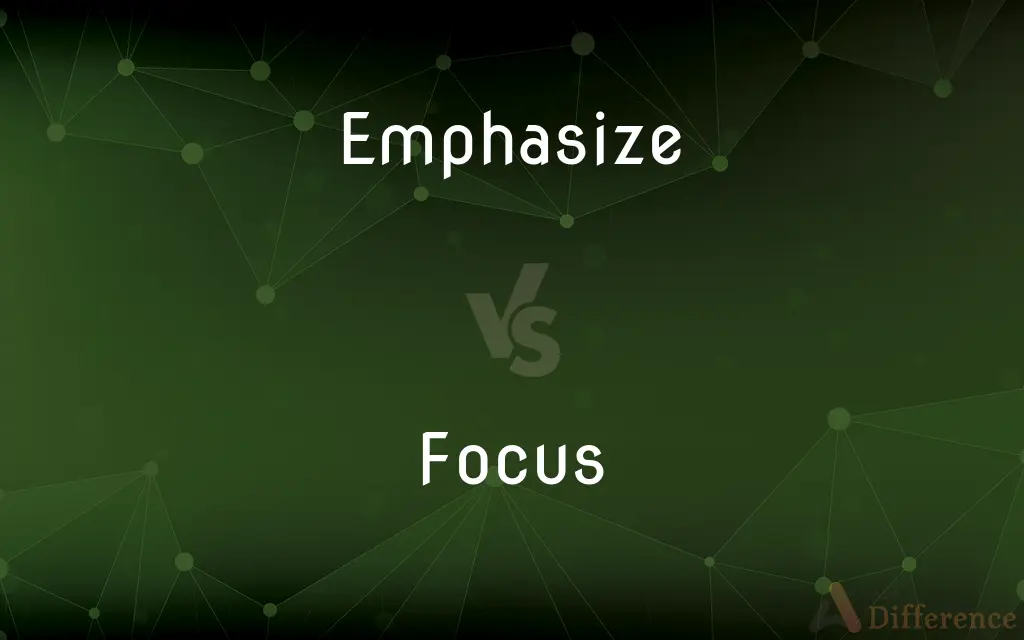Emphasize vs. Focus — What's the Difference?
Edited by Tayyaba Rehman — By Urooj Arif — Updated on April 6, 2024
Emphasize is about making something more clearly defined or noticeable, often through highlighting its importance. Focus involves directing attention or effort towards a specific point or task.

Difference Between Emphasize and Focus
Table of Contents
ADVERTISEMENT
Key Differences
Emphasize involves highlighting the importance or significance of something, making it stand out through various means such as stress, intonation, or repetition. Focus, on the other hand, is about directing one's attention or resources towards a particular area or activity, prioritizing it over others.
While emphasizing is often about making a particular aspect, detail, or idea more noticeable or important in the context of communication, focusing is more about the allocation of cognitive or physical resources to a specific goal or task.
To emphasize something can involve verbal and non-verbal cues in communication to ensure that it is perceived as important or central by the audience. In contrast, to focus on something usually means to concentrate one's mental or physical efforts on it, which can be a more internal process.
Emphasis can change the perception of information, making certain elements stand out and possibly affecting the audience's understanding or reaction. Whereas focusing is a strategic approach to achieving an objective, involving narrowing down the scope of attention or activity to enhance efficiency or effectiveness.
While emphasizing is crucial in the realm of communication for clarity and persuasion, focusing is essential in both individual and collaborative efforts to achieve specific outcomes or progress in various tasks or projects.
ADVERTISEMENT
Comparison Chart
Definition
Making something more noticeable or important
Directing attention or effort to a specific point
Method
Highlighting through stress, intonation, repetition
Concentrating mental or physical efforts
Purpose
To make aspects noticeable for clarity or persuasion
To achieve goals through strategic attention
Application
Communication (verbal and non-verbal)
Task or goal-oriented activities
Outcome
Changes perception, highlights importance
Enhances efficiency, achieves objectives
Compare with Definitions
Emphasize
Making ideas noticeable.
The report emphasized the successes of the project, drawing attention to its impacts.
Focus
Goal-oriented activities.
The study group focused on preparing for the upcoming exams, allocating specific times for each subject.
Emphasize
Highlighting importance.
The teacher emphasized the key points of the lecture for clarity.
Focus
Narrowing down attention.
The team decided to focus on the most critical issues first.
Emphasize
Stress on specifics.
In her speech, she emphasized the need for immediate action on climate change.
Focus
Concentrating efforts.
He focused his energy on finishing the project before the deadline.
Emphasize
Persuasion through emphasis.
Advertisements often emphasize benefits of products to persuade consumers.
Focus
Enhancing task efficiency.
Focusing on one task at a time improves overall productivity.
Emphasize
Enhancing understanding.
To emphasize the concept, the instructor used several examples and analogies.
Focus
Strategic prioritization.
The company will focus on expanding into new markets this year.
Emphasize
Give special importance or value to (something) in speaking or writing
I would emphasize that I am not an economist
They emphasize the need for daily, one-to-one contact between parent and child
Focus
The centre of interest or activity
This generation has made the environment a focus of attention
Emphasize
Lay stress on (a word or phrase) when speaking
His father emphasized the wrong words in his sentence
Focus
The state or quality of having or producing clear visual definition
His face is rather out of focus
The incident brought her feelings for Alexander sharply into focus
Emphasize
Make (something) more clearly defined
A hip-length jacket which emphasized her shape
Focus
One of the fixed points from which the distances to any point of a given curve, such as an ellipse or parabola, are connected by a linear relation.
Emphasize
To give emphasis to; stress
She emphasized that the matter was urgent.
Focus
An element of a sentence that is given prominence by intonational or other means.
Emphasize
To cause to appear important or deserving of attention
The bank failure emphasized the need for reform.
Focus
Adapt to the prevailing level of light and become able to see clearly
Try to focus on a stationary object
Emphasize
To give prominence of sound to (a syllable or word) in pronouncing or in accordance with a metrical pattern.
Focus
Pay particular attention to
The study will focus on a number of areas in Wales
Emphasize
(transitive) To stress, give emphasis or extra weight to (something).
His two-fingered gesture emphasized what he had told his boss to do with his job.
Focus
Place the focus on (an element of a sentence).
Emphasize
To utter or pronounce with a particular stress of voice; to make emphatic; as, to emphasize a word or a phrase.
Focus
The distinctness or clarity of an image rendered by an optical system.
Emphasize
To stress, single out as important;
Dr. Jones emphasizes exercise in addition to a change in diet
Focus
The state of maximum distinctness or clarity of such an image
In focus.
Out of focus.
Emphasize
Give extra weight to (a communication);
Her gesture emphasized her words
Focus
An apparatus used to adjust the focal length of an optical system in order to make an image distinct or clear
A camera with automatic focus.
Focus
A point at which rays of light or other radiation converge or from which they appear to diverge, as after refraction or reflection in an optical system
The focus of a lens. Also called focal point.
Focus
See focal length.
Focus
A center of interest or activity
"Precisely how diet affects E. coli in livestock is the focus of current research" (Cindy Engel).
Focus
Close or narrow attention; concentration
"He was forever taken aback by [New York's] pervasive atmosphere of purposefulness—the tight focus of its drivers, the brisk intensity of its pedestrians" (Anne Tyler).
Focus
A condition in which something can be clearly apprehended or perceived
Couldn't get the problem into focus.
Focus
(Medicine) The region of a localized bodily infection or disease.
Focus
(Geology) The point of origin of an earthquake.
Focus
(Mathematics) A fixed point whose relationship with a directrix determines a conic section.
Focus
To cause (light rays, for example) to converge on or toward a central point; concentrate.
Focus
To render (an object or image) in clear outline or sharp detail by adjustment of one's vision or an optical device; bring into focus.
Focus
To adjust (a lens, for example) to produce a clear image.
Focus
To direct toward a particular point or purpose
Focused all their attention on finding a solution to the problem.
Focus
To converge on or toward a central point of focus; be focused.
Focus
To adjust one's vision or an optical device so as to render a clear, distinct image.
Focus
To concentrate attention or energy
A campaign that focused on economic issues.
Focus
A point at which reflected or refracted rays of light converge.
The heat of sunlight at the focus of a magnifying glass can easily set dry leaves on fire.
Focus
A point of a conic at which rays reflected from a curve or surface converge.
Focus
The fact of the convergence of light on the photographic medium.
Unfortunately, the license plate is out of focus in this image.
Focus
The quality of the convergence of light on the photographic medium.
During this scene, the boy’s face shifts subtly from soft focus into sharp focus.
Focus
(uncountable) Concentration of attention.
I believe I can bring the high degree of focus required for this important job.
Focus
The exact point of where an earthquake occurs, in three dimensions (underneath the epicentre).
The earthquake's focus was at exactly 37 degrees north, 18 degrees south, seventy five meters below the ground.
Focus
(GUI) The status of being the currently active element in a user interface, often indicated by a visual highlight.
Text entered at the keyboard or pasted from a clipboard is sent to the component which currently has the focus.
Focus
(linguistics) The most important word or phrase in a sentence or passage, or the one that imparts information.
Focus
An object used in casting a magic spell.
Focus
To concentrate during a task.
I have to focus on my work.
Focus
(transitive) To direct attention, effort, or energy to a particular audience or task.
The president focused her remarks to the newcomers.
Focus
(transitive) To cause (rays of light, etc) to converge at a single point.
Focus
(transitive) To adjust (a lens, an optical instrument) in order to position an image with respect to the focal plane.
You'll need to focus the microscope carefully in order to capture the full detail of this surface.
Focus
(intransitive) To concentrate one’s attention.
If you're going to beat your competitors, you need to focus.
Focus
To transfer the input focus to (a visual element), so that it receives subsequent input.
The text box won't receive the user's keystrokes unless you explicitly focus it.
Focus
To aggregate figures of accounts.
Focus
A point in which the rays of light meet, after being reflected or refracted, and at which the image is formed; as, the focus of a lens or mirror.
Focus
A point so related to a conic section and certain straight line called the directrix that the ratio of the distance between any point of the curve and the focus to the distance of the same point from the directrix is constant.
Focus
A central point; a point of concentration.
Focus
To bring to a focus; to focalize; as, to focus a camera.
Focus
The concentration of attention or energy on something;
The focus of activity shifted to molecular biology
He had no direction in his life
Focus
Maximum clarity or distinctness of an image rendered by an optical system;
In focus
Out of focus
Focus
Maximum clarity or distinctness of an idea;
The controversy brought clearly into focus an important difference of opinion
Focus
A central point or locus of an infection in an organism;
The focus of infection
Focus
Special emphasis attached to something;
The stress was more on accuracy than on speed
Focus
A point of convergence of light (or other radiation) or a point from which it diverges
Focus
A fixed reference point on the concave side of a conic section
Focus
Direct one's attention on something;
Please focus on your studies and not on your hobbies
Focus
Cause to converge on or toward a central point;
Focus the light on this image
Focus
Bring into focus or alignment; to converge or cause to converge; of ideas or emotions
Focus
Become focussed or come into focus;
The light focused
Focus
Put (an image) into focus;
Please focus the image; we cannot enjoy the movie
Common Curiosities
How does focusing differ from emphasizing?
Focusing involves directing attention or efforts towards a specific task or goal, whereas emphasizing is about making something stand out in communication.
Can you emphasize while focusing?
Yes, one can emphasize certain aspects of a task or topic while focusing on it, although they involve different actions (making something stand out vs. concentrating efforts).
What does it mean to emphasize a point?
To emphasize a point means to make it more noticeable or important, often through stress or highlighting its significance.
How can focus improve productivity?
Focus improves productivity by narrowing down attention on specific tasks, reducing distractions, and enabling more efficient use of time and resources.
Can focusing be detrimental?
Over-focusing on one area can sometimes lead to neglecting other important aspects, which might be detrimental in some contexts.
Why is emphasis important in communication?
Emphasis is important in communication because it helps ensure clarity, enhances understanding, and can persuade or influence the audience's perception.
How do professionals use emphasis and focus?
Professionals use emphasis to highlight critical points or priorities and focus to efficiently allocate their efforts towards achieving specific objectives.
How does culture affect emphasis and focus?
Cultural values and norms can influence what individuals or groups emphasize or focus on, reflecting societal priorities and perceptions.
Why might emphasis shift in a project?
Emphasis might shift in a project due to changing objectives, feedback, or the emergence of new information or priorities.
What tools can help in focusing on tasks?
Tools like task lists, priority matrices, and distraction blockers can aid in focusing efforts on specific tasks or goals.
How can one improve their ability to focus?
Improving focus can involve practice, reducing distractions, setting clear goals, and using techniques like time management or mindfulness.
Is emphasizing always verbal?
No, emphasizing can also be non-verbal, using cues like gestures, facial expressions, or text formatting to highlight importance.
How do emphasis and focus relate to leadership?
Effective leadership often involves emphasizing key values or goals and focusing team efforts on strategic priorities for success.
Can focusing on the wrong things impact outcomes?
Yes, focusing on less important or irrelevant aspects can divert resources from critical areas, negatively impacting outcomes.
Can focus change over time?
Yes, focus can and often does shift over time as goals, priorities, and circumstances evolve.
Share Your Discovery

Previous Comparison
Barmaid vs. Bartender
Next Comparison
Glucose vs. LactoseAuthor Spotlight
Written by
Urooj ArifUrooj is a skilled content writer at Ask Difference, known for her exceptional ability to simplify complex topics into engaging and informative content. With a passion for research and a flair for clear, concise writing, she consistently delivers articles that resonate with our diverse audience.
Edited by
Tayyaba RehmanTayyaba Rehman is a distinguished writer, currently serving as a primary contributor to askdifference.com. As a researcher in semantics and etymology, Tayyaba's passion for the complexity of languages and their distinctions has found a perfect home on the platform. Tayyaba delves into the intricacies of language, distinguishing between commonly confused words and phrases, thereby providing clarity for readers worldwide.














































